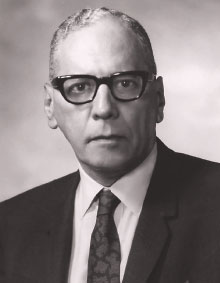WPS Creates Human Rights Award To Honor Charles Prudhomme, M.D.
Abstract
This award celebrates the lives of psychiatrists who have contributed to the forward movement of social justice and human rights.
The Washington Psychiatric Society (WPS) recently established the Dr. Charles Prudhomme Human Rights Award in honor of Charles Prudhomme, M.D., a psychiatrist and psychoanalyst, an early organizer of WPS, and the first Black psychiatrist to hold a national elected office in APA.

Charles Prudhomme, M.D.
The award was conceived by Eliot Sorel, M.D., and Constance E. Dunlap, M.D. While doing research for APA’s Chester Pierce Award for Human Rights, Sorel had learned of Dr. Charles Prudhomme’s work in APA, his steadfast advocacy for human rights, and his collaboration with Pierce and others in the founding of the Black Psychiatrists of America (BPA) in 1969. He and Dunlap jointly proposed the creation of the award to the WPS Board of Directors. In March, the WPS Board unanimously ratified the award under the leadership of Anne Marie Dietrich, M.D., WPS president-elect and acting president.
The award will be presented at WPS’s annual awards event. Awardees will be selected from the pool of nominations submitted by psychiatrists nationally.
Prudhomme (1908-1988) had a commanding presence, intellect, and keen ability to articulate unpopular views that challenged the status quo of his time. He was born in Opelousas, La., when “Jim Crow” was the law of the land, impacting his early life and career. After completing his undergraduate (1931) and medical degrees (1935) at Howard University, he was denied admittance to St. Elizabeths psychiatry residency training program in Washington, D.C., due to strictly enforced segregation. Instead, Prudhomme completed his training in psychiatry and neurology at the University of Chicago in 1938, after which he again applied to St. Elizabeths Hospital. Once again, he was spurned despite a letter of support from then U.S. Sen. Harry Truman, who was able to secure a position for him at a segregated VA Hospital in Tuskegee, Ala. A visionary who remained clear about what was possible for himself and for America, he advocated for the desegregation of the VA Hospital system in 1948.
Returning to Howard University Hospital in 1943, Prudhomme led its Army Specialized Training Unit while simultaneously training in psychoanalysis under Freida Fromm Reichman, M.D. He commenced training at the Washington Psychoanalytic Institute in 1949 and graduated in 1956. In 1970 he was elected vice president of APA, the first Black psychiatrist to hold a national office. (June Jackson Christmas, M.D., was the second in 1974; Altha Stewart, M.D., became APA’s first Black president in 2018.) A member of the Washington Psychoanalytic Society and the American Psychoanalytic Association (APsaA), Prudhomme was later inducted as a life fellow of APsaA and maintained a private practice in Washington, D.C., for 35 years before retiring in 1973.
Prudhomme was instrumental in establishing the WPS. When it was formed in 1949, meetings were held at the Washington National Airport restaurant because meetings could not be held in racially segregated Washington, D.C. He was an original member of the Committee on Organization, whose vision appealed to local psychiatrists to “provide a common meeting ground for all psychiatrists, which would sponsor and develop a scientific program of high caliber, and foster its progress,” according to a 1949 letter to local psychiatrists housed in the Library of Congress.
Prudhomme was an outspoken critic of the impact of pervasive anti-Black racism on the psychiatric care and treatment of Black people. Later, he appealed to APA to file an amicus brief supporting the 1954 Supreme Court decision in the case Brown vs. Board of Education of Topeka; the APA summarily refused.
Undeterred by resistance to his full participation in peer activities and opportunities, Prudhomme remained committed to ensuring that organized medicine acknowledge the humanity of all people.
Given the current mood of our country, we must remember trailblazers like Prudhomme who spoke inconvenient truths as they advocated for the creation of a more perfect union. In 1949, when WPS was established, its credo was (and remains) “Pursuit of Excellence, Social Justice, and Sharing Good Times Together.” Charles Prudhomme was one of the early pioneers in WPS who embodied this philosophy. This award will celebrate the lives of fellow psychiatrists whose spirit and professionalism contribute to the forward movement of social justice and human rights, ultimately transforming medicine and the world. The award will be a reminder of this mandate for us all. ■
Resources
The American Journal of Psychiatry article “Reflections on Racism”




